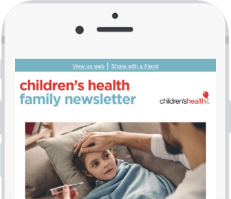Graduating high school is a major milestone for all teens. Whether they plan to go to college in the fall, enroll in a technical program or embark upon a career, it's a time of significant change and transitions. For teens with type 1 diabetes (T1D), an additional transition occurs – moving from pediatric endocrinology care to adult endocrinology care. In doing so, teens with T1D are taking on a new role of young adult responsibility and ownership in their diabetes management.
 When our former patient Eliana began college in the fall of 2020, she felt uncertain for many reasons – the COVID-19 pandemic being at the top of the list. However, managing her T1D was not one of them thanks to her support system and care team led by Soumya Adhikari, M.D., pediatric endocrinologist at Children's Health℠. "I felt confident in my ability to manage my condition and very blessed for the quality of care I received," Eliana says.
When our former patient Eliana began college in the fall of 2020, she felt uncertain for many reasons – the COVID-19 pandemic being at the top of the list. However, managing her T1D was not one of them thanks to her support system and care team led by Soumya Adhikari, M.D., pediatric endocrinologist at Children's Health℠. "I felt confident in my ability to manage my condition and very blessed for the quality of care I received," Eliana says.
Dr. Adhikari shares his expertise and Eliana adds her experience to offer families tips for facing this major life transition.
1. Plan ahead
The American Academy of Pediatrics (AAP) recommends patients, families and health care providers begin planning for this care transition as early as age 14. Dr. Adhikari encourages this same age range for starting these conversations – provided that the adolescent was diagnosed with T1D by age 10 or so.
"If there's an adolescent who was just diagnosed at age 13, we may not approach the transition topic until a little later," explains Dr. Adhikari. "We want them and their family to have a good handle on the disease and a few years of experience managing their T1D before that."
When starting those transition conversations, Dr. Adhikari says his team has those conversations with the adolescent without their family member in the room – when the family is comfortable doing so. The goal is to help adolescents gradually assume responsibility and independence with their medical care.
When your teen is ready to start exploring what school they would like to attend, it is also important to plan ahead by familiarizing yourself with the disability resources that each one provides. Many school's disability resource departments offer housing, dining and academic accommodations. Comparing and contrasting these resources can help your teen make a decision on where they'd feel most supported. "I get early registration time so I can make sure I have adequate time for meals in between classes," Eliana says.
2. Expect to encounter challenges
As with any big change, we should always expect the unexpected. Even when a teen's treatment routine is "ideal" or consistent, it is possible for blood sugar levels to still go out of range. Therefore, we should expect that the transition to college, changes in routine, late study nights, increased stress and academic rigor can also cause your blood sugar levels and A1C to fluctuate. Being prepared can help you best manage your health.
When asked what was most unexpected about managing her T1D in college, Eliana says it's how her schedule is different in any given week. "Taking advantage of random clubs or social events, different food offered at dining halls and campus pop-up opportunities is something I would recommend to everyone, but those events can definitely wreak havoc on blood glucose levels at first."
3. Provide support and reassurance
Opening lines of communication with your teen early – before they take on the daily independence of managing their condition – can help them think about different situations and make the necessary preparations. Let your teen know you are there to support them through the transition period and they can come to you with any concerns. Empower your teen to lean on their support system to help guide them through the process of learning how to manage their T1D independently.
 "We can acknowledge certain truths and the opportunities and challenges that will be there," says Dr. Adhikari. "Why wouldn't you want to participate in that conversation to help them plan for that? This way, they can get that information and make those decisions in a shared manner with family instead of coming to certain conclusions on their own."
"We can acknowledge certain truths and the opportunities and challenges that will be there," says Dr. Adhikari. "Why wouldn't you want to participate in that conversation to help them plan for that? This way, they can get that information and make those decisions in a shared manner with family instead of coming to certain conclusions on their own."
"I am so grateful for my family and the community I've made from having T1D," Eliana says. "I know if I need to vent or ask advice about the best way to handle a treatment for high blood sugar, my parents are always happy to return my call. I also feel very lucky to live with friends who follow me on the Dexcom mobile app and are willing to do anything in case of an emergency."
4. Engage in open discussions
Many of the situations and challenges with young adulthood apply to everyone. "For the person with T1D, some of them are magnified," says Dr. Adhikari. Some of the topics that teens and families should discuss are:
- Emergency action plan – including detailed steps on what to do if they have a severe hypoglycemic incident
- What to disclose to new people – how much to tell roommates and new friends about T1D
- Where are they going to get medical care – campus health services or a doctor's office
- Whether they need any accommodations in the classroom
"We provide a transitioning to adult diabetes care resource to families," explains Dr. Adhikari. "It's basically a list of things to discuss, which include an emphasis on planning ahead, maintaining a support system and addressing responsible social behaviors."
Eliana says, "I always introduce myself to my professors at the start of each semester and ask if they received my accommodation letter. I have found that being open about my diabetes and being excited to meet my professors has been invaluable in my academic experience."
Taking newfound responsibility for health care
Entering young adulthood means taking on a new level of responsibility in medical care – especially for those who move away from home, like Eliana. Teens with T1D need to also consider the following:
- Access to ancillary health services, including mental health services
- Dining arrangements – understanding how to track dining hall foods
- How alcohol and other substances can affect T1D
- Taking responsibility for ordering diabetes supplies every month or quarter – including having backup supplies on-hand in case of a natural disaster or other unforeseen events
"I have always been pretty independent in managing my diabetes but moving away from home taught me the importance of advocating for my needs," says Eliana. "Having the support – and lenience, if I ever need it – of friends, professors and roommates in regard to my diabetes has been amazing."
 Eliana is now preparing to head into her last year of college, majoring in English on the pre-med track. She is currently the president of The Diabetes Link chapter at her school, as well as president of Dance Marathon – an organization that spreads awareness and fundraises for local children's hospitals. Eliana also serves as a peer mentor for students learning general chemistry.
Eliana is now preparing to head into her last year of college, majoring in English on the pre-med track. She is currently the president of The Diabetes Link chapter at her school, as well as president of Dance Marathon – an organization that spreads awareness and fundraises for local children's hospitals. Eliana also serves as a peer mentor for students learning general chemistry.
My biggest piece of advice for teens with diabetes who are transitioning to college is to give yourself grace and ask for help if you need it.
"My biggest piece of advice for teens with diabetes who are transitioning to college is to give yourself grace and ask for help if you need it," Eliana says.
Additional resources
Many other trusted organizations create materials that may help your family during this transition. Below are some organizations you might find helpful:
- The Diabetes Link: Formerly known as the College Diabetes Network, this organization provides diabetes support for young adults.
- JDRF North Texas and Oklahoma: View an online panel from our local JDRF chapter addressing teens with T1D going to college.
- Juvenile Diabetes Research Foundation (JDRF): Review information on transitioning from pediatric to adult care.
Get support
Children's Health endocrinologists can help teens and their families transition from pediatric care to adult care for type 1 diabetes and other chronic health conditions. Make an appointment with a pediatric endocrinologist to get started.
Download the Diabetes Advisor App
For around-the-clock diabetic care, download the Diabetes Advisor App. Text "diabetes" to 77444 to download. Learn more about the Pediatric Diabetes Advisor App.
Message frequency varies. Message and data rates may apply. See our Privacy Policy and Terms of Service.
Reply STOP to opt out of texts and reply HELP for help.

Thank you!
You are now subscribed to the Children's Health Family Newsletter.
Children's Health will not sell, share or rent your information to third parties. Please read our privacy policy.
